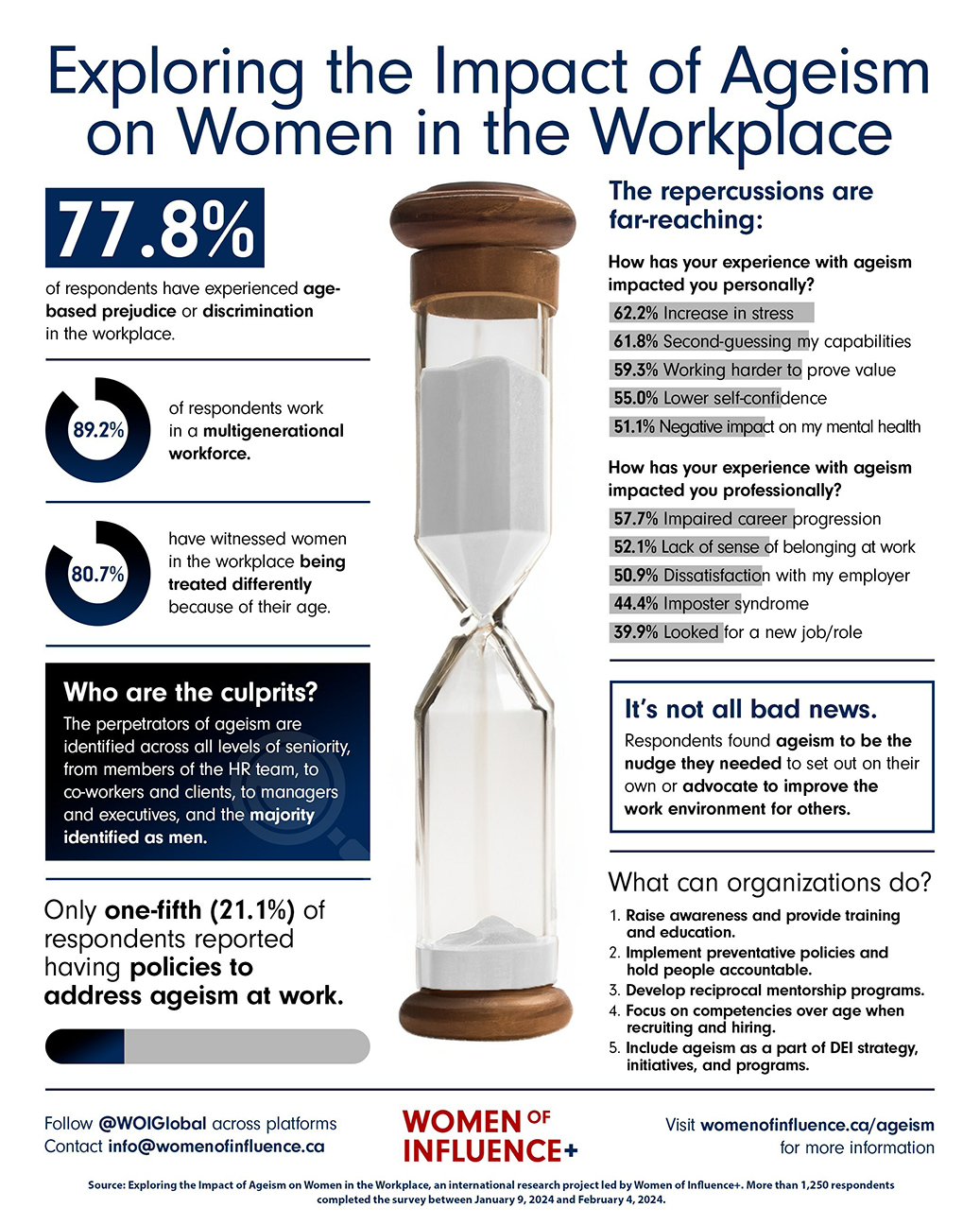DEI: 10 ways ageism affects women in the workplace
DEI: 10 ways ageism affects women in the workplace Supermarket Perimeter


Sustainable Development Goals and Workplace Diversity, Equity, and Inclusion Initiatives
A recent survey conducted by Houston-based Wizehire revealed that only 22% of Americans reported having diversity, equity, and inclusion (DEI) initiatives and programs in their workplaces. When it came to diverse hiring practices and inclusive social events, the figure dropped to 16%. These findings were part of Wizehire’s “2024 Women in Leadership Report,” which highlighted the challenges faced by women in leadership positions. The report also emphasized the importance of achieving the Sustainable Development Goals (SDGs) in creating more equitable workspaces.
Challenges for Women in Leadership
- 33% of Americans surveyed believe that balancing work and family responsibilities is the biggest obstacle for women in leadership positions.
- Hostile work environments were identified as the second biggest challenge, affecting both men and women equally.
Carmen Bryant, Vice President of Marketing at Wizehire, emphasized the role of businesses in creating equitable workspaces that promote the well-being and success of all employees.
The Impact of Ageism on Women in the Workplace
Women of Influence+, a global organization based in Toronto, conducted a survey titled “Exploring the Impact of Ageism on Women in the Workplace.” The survey included responses from over 1,250 women across 46 countries. The findings revealed that:
- 77.8% of women reported encountering age-related discrimination in their careers.
- 80.7% of women witnessed other women being treated differently due to their age.
- Ageism affected women at various stages of their careers, with 40.7% experiencing discrimination within the first 10 years and 55.9% encountering ageism after 21 years.
The report highlighted the need for systemic change to eliminate age-based discrimination and create inclusive work environments that value employees based on their capabilities rather than their age.
Effects of Ageism on Women in the Workplace
- 74.8% of women experienced age-based stereotypes and assumptions.
- 50.1% reported a lack of respect from colleagues.
- 49% faced unfair treatment in promotion processes.
- 62.2% reported increased stress due to experiencing ageism.
- 61.8% second-guessed their capabilities.
- 59.3% overcompensated or worked harder to prove their worth.
- 55% experienced lower self-confidence as a result of age-based discrimination.
- 57.7% reported impaired career progression due to ageism.
- 52.1% felt a lack of sense of belonging at work due to ageism.
- 50.9% expressed dissatisfaction with their employer due to ageism.
The survey findings emphasized the urgent need for collective action to address ageism and create inclusive workplaces that value employees regardless of their age.
The Intersectionality of Ageism and Gender
When discussing diversity, equity, and inclusion, it is crucial to consider how different forms of discrimination intersect and affect individuals belonging to multiple marginalized groups. The Women of Influence+ report highlighted the intersectionality of ageism with other aspects of identity, such as race, ability, and gender. The findings revealed:
- 69.2% of respondents believed that ageism disproportionately affects women.
- Respondents noted that ageism and sexism are intertwined, making it challenging to separate the two.
- Women of color face higher levels of ageism in the workplace, with expectations of being older while still appearing youthful.
These findings underscore the importance of addressing intersectional discrimination and working towards creating inclusive environments that do not limit opportunities based on age or any other aspect of identity.

Source: Women of Influence+
This article is an excerpt from the April 2024 issue of Supermarket Perimeter. You can read the entire DEI feature and more in the digital edition here.
SDGs, Targets, and Indicators
| SDGs | Targets | Indicators |
|---|---|---|
| SDG 5: Gender Equality | Target 5.1: End all forms of discrimination against all women and girls everywhere | – 77.8% of women surveyed reported encountering age-related discrimination in their careers – 80.7% of women have witnessed other women in the workplace being treated differently because of their age |
| SDG 8: Decent Work and Economic Growth | Target 8.5: By 2030, achieve full and productive employment and decent work for all women and men, including for young people and persons with disabilities, and equal pay for work of equal value | – Only 22% of Americans said their workplaces offered diversity, equity, and inclusion (DEI) initiatives and programs – 16% of Americans said their workplaces offered diverse hiring practices and inclusive social events |
| SDG 10: Reduced Inequalities | Target 10.3: Ensure equal opportunity and reduce inequalities of outcome, including by eliminating discriminatory laws, policies, and practices and promoting appropriate legislation, policies, and action in this regard | – 74.8% of women experienced age-based stereotypes and/or assumptions – 50.1% said they were shown a lack of respect from colleagues – 49% reported unfair treatment in promotion processes – 62.2% reported increased stress due to experiencing ageism – 61.8% reported second-guessing capabilities – 59.3% overcompensate or work harder to prove their worth – 55% said they experienced lower self-confidence as a result of age-based discrimination – 57.7% reported impaired career progression due to ageism – 52.1% reported a lack of sense of belonging at work due to ageism – 50.9% reported experiencing dissatisfaction with their employer due to ageism |
1. Which SDGs are addressed or connected to the issues highlighted in the article?
The issues highlighted in the article are connected to SDG 5: Gender Equality, SDG 8: Decent Work and Economic Growth, and SDG 10: Reduced Inequalities.
2. What specific targets under those SDGs can be identified based on the article’s content?
Based on the article’s content, the specific targets that can be identified are:
- Target 5.1: End all forms of discrimination against all women and girls everywhere
- Target 8.5: By 2030, achieve full and productive employment and decent work for all women and men, including for young people and persons with disabilities, and equal pay for work of equal value
- Target 10.3: Ensure equal opportunity and reduce inequalities of outcome, including by eliminating discriminatory laws, policies, and practices and promoting appropriate legislation, policies, and action in this regard
3. Are there any indicators mentioned or implied in the article that can be used to measure progress towards the identified targets?
Yes, there are indicators mentioned in the article that can be used to measure progress towards the identified targets. These indicators include:
- 77.8% of women surveyed reported encountering age-related discrimination in their careers
- 80.7% of women have witnessed other women in the workplace being treated differently because of their age
- Only 22% of Americans said their workplaces offered diversity, equity, and inclusion (DEI) initiatives and programs
- 16% of Americans said their workplaces offered diverse hiring practices and inclusive social events
- 74.8% of women experienced age-based stereotypes and/or assumptions
- 50.1% said they were shown a lack of respect from colleagues
- 49% reported unfair treatment in promotion processes
- 62.2% reported increased stress due to experiencing ageism
- 61.8% reported second-guessing capabilities
- 59.3% overcompensate or work harder to prove their worth
- 55% said they experienced lower self-confidence as a result of age-based discrimination
- 57.7% reported impaired career progression due to ageism
- 52.1% reported a lack of sense of belonging at work due to ageism
- 50.9% reported experiencing dissatisfaction with their employer due to ageism
4. SDGs, Targets, and Indicators
| SDGs | Targets | Indicators |
|---|---|---|
| SDG 5: Gender Equality | Target 5.1: End all forms of discrimination against all women and girls everywhere | – 77.8% of women surveyed reported encountering age-related discrimination in their careers – 80.7% of women have witnessed other women in the workplace being treated differently because of their age |
| SDG 8: Decent Work and Economic Growth | Target 8.5: By 2030, achieve full and productive employment and decent work for all women and men, including for young people and persons with disabilities, and equal pay for work of equal value | – Only 22% of Americans said their workplaces offered diversity, equity, and inclusion (DEI) initiatives and programs – 16% of Americans said their workplaces offered diverse hiring practices and inclusive social events |
| SDG 10: Reduced Inequalities | Target 10.3: Ensure equal opportunity and reduce inequalities of outcome, including by eliminating discriminatory laws, policies, and practices and promoting appropriate legislation, policies, and action in this regard | – 74.8% of women experienced age-based stereotypes and/or assumptions – 50.1% said they were shown a lack of respect from colleagues – 49% reported unfair treatment in promotion processes – 62.2% reported increased stress due to experiencing ageism – 61.8% Behold! This splendid article springs forth from the wellspring of knowledge, shaped by a wondrous proprietary AI technology that delved into a vast ocean of data, illuminating the path towards the Sustainable Development Goals. Remember that all rights are reserved by SDG Investors LLC, empowering us to champion progress together. Source: supermarketperimeter.com
Join us, as fellow seekers of change, on a transformative journey at https://sdgtalks.ai/welcome, where you can become a member and actively contribute to shaping a brighter future.
|








